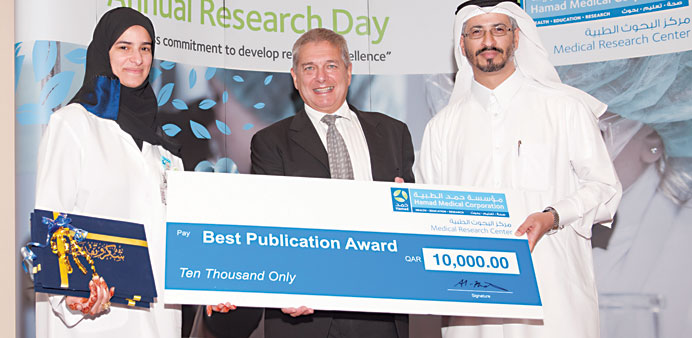By Noimot Olayiwola/Staff Reporter
In a quest to facilitate translation of findings from basic science to practical applications, HMC will by year-end open an interim translational research facility at Hamad Medical City, ahead of the completion of its planned state-of-the-art Translational Research Institute (TRI), a senior official said yesterday.
The completion of TRI, also being built at Hamad Medical City, which is expected by 2015, was initially slated for this year- end.
“The design and planning of TRI has already started and because we want to ensure high standard, the construction of the facility will take a couple of years and hopefully it will be completed by 2015-end,” HMC’s Medical Research Centre (MRC) chairman Dr Hareth al-Khater said.
He was speaking alongside two prominent researchers – HMC medicine department chairman Prof Abdul Badi Abou Samra and UK-based University of Warwick medicine professor Dr Harpal S Randeva, at a press conference yesterday on the sidelines of the HMC Second Annual Research Day 2013.
During the event, cash prizes were presented to several researchers as ‘best publication’ awards.
Translational research is scientific research that facilitates the translation of findings from basic science to practical applications that enhance human health and well-being.
“In between, we hope to begin to run by the year-end an interim translational research facility that will host laboratory researchers in order to compliment researches in clinical areas pending the opening of TRI,” Dr al-Khater said.
The official maintained that both facilities are being situated at Medical City in order to facilitate communication between physicians/clinicians and scientists for better results.
He said when completed, TRI will provide state-of-the-art core research facilities to facilitate internationally competitive outcomes in translational (bench to bedside) and clinical research.
“We hope that the facilities will be useful for conducting basic research and be where patients can receive treatment and take part in clinical trials,” Dr al-Khater stated.
With a focus upon the fields of cancer, trauma, infectious diseases, neuroscience, diabetes, obesity, cardiovascular disease, and women’s and children’s health, TRI will provide researchers with ready access to facilities that would otherwise be unavailable, leading to the translation of basic biomedical discoveries into new diagnostic biomarkers and therapies.
The facility will consolidate all research groups across HMC and encourage collaboration and innovation through a number of cross-cutting themes such as bioinformatics, ethics, molecular imaging, functional genomics, proteomics and metabolomics, clinical imaging, clinical trials and biostatistics.
MRC, formed in 1998, is a world-class facility supporting innovative research in Qatar with a vision to be recognised as a centre of collaborative research, with outcomes translating into measurable improvements in healthcare.
MRC encourages researchers to lead change by identifying and finding solutions to challenges.
Currently, the centre, which received up to 13 research grants worth over QR45mn last year, supports medical research efforts in areas which include: cancer, cardiovascular diseases, diabetes, genomic factors on health of individuals and population, women’s and children’s health, public health and professions allied to medicine (PAMs).
Also, up to QR50mn, representing 1% of HMC’s annual budget, is being allocated to the centre yearly as internal research budget by the Supreme Council of Health.

Dr al-Khater presenting a cheque to one of the award winner at the HMC Second Annual Research Day event yesterday.
